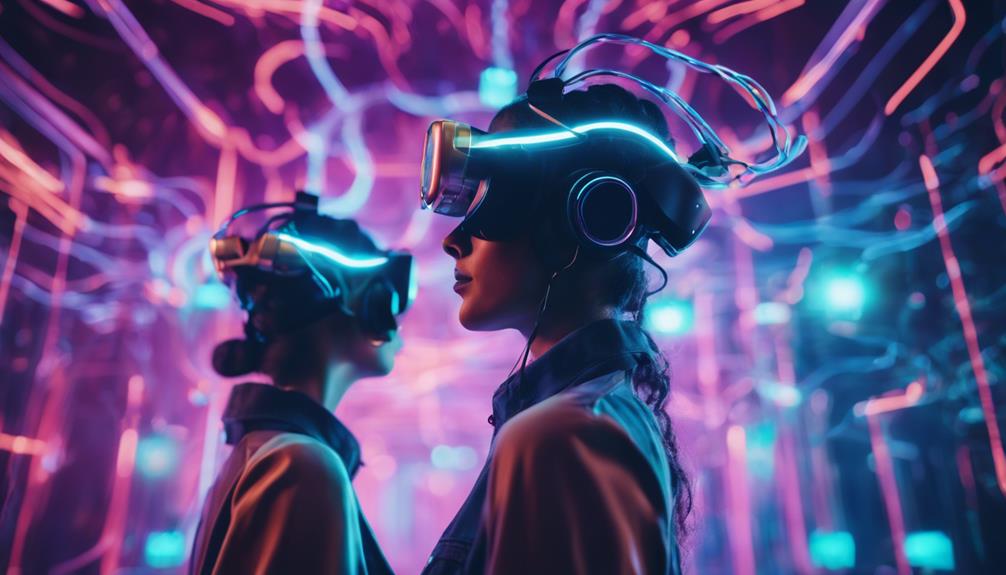As virtual sex technologies rapidly advance, they're redefining intimacy and blurring the lines between digital and real-life connections. The proliferation of internet-enabled sex toys, devices, and services is transforming the dating landscape, raising important questions about the future of relationships. While virtual sex can spice up marriages and benefit long-distance relationships, it also risks addiction and challenges genuine connections. As the industry evolves, it's vital to weigh benefits against concerns and promote responsible use. As technology continues to push the boundaries of virtual intimacy, one thing is certain: the future of relationships hangs in the balance, and the implications are only just beginning to unfold.
Key Takeaways
• Virtual sex technologies are advancing, promising unparalleled intimacy and realism, revolutionizing the industry by 2030.
• The convergence of virtual reality, augmented reality, and artificial intelligence is creating immersive sexual experiences that blur fantasy and reality.
• The future of virtual sex raises questions about boundaries between virtual and real-life relationships, and the potential benefits and concerns surrounding the industry.
• Virtual sex is redefining traditional dating norms, blurring lines between commitment and freedom, and shifting cultural attitudes towards casual hookups and fleeting connections.
• As virtual sex devices become more sophisticated, it's essential to weigh benefits against concerns, ensuring responsible use and open communication in relationships.
Revolutionizing Dating Standards
Sexting, internet porn, adultery websites, and smartphone apps have dramatically shifted the dating landscape, redefining the way people connect, interact, and engage in intimate relationships. The rise of these digital platforms has led to a cultural shift in the way people approach dating, with many opting for casual hookups and fleeting connections over meaningful relationships.
This shift has also led to a proliferation of infidelity, with many individuals engaging in extramarital affairs online. As a result, traditional dating norms have been turned upside down, and the concept of intimacy has taken on a new meaning. With the ease of digital access, people can now engage in multiple relationships simultaneously, blurring the lines between commitment and freedom.
Virtual Sex Technologies Advance

As technology continues to push the boundaries of human intimacy, innovative virtual sex technologies are emerging, promising to revolutionize the way people experience erotic connections. Average middle-class Americans are now being targeted with mass-produced virtual sex products. Internet-enabled sex toys and devices like RealTouch offer hands-free sexual experiences. The Nintendo Wii has even entered the adult sex toy market.
Expect more sophisticated virtual sex devices in the next decade, including full or partial bodysuits. Hotels are exploring virtual sex services, and technology may allow changing partners' appearances during sex by 2030. Special fibers in hotel sheets and sleepwear could enhance sensory experiences, further blurring the lines between reality and fantasy.
Benefits and Concerns Explored

Virtual sex offers a vital double-edged sword, promising to spice up marriages and benefit long-distance relationships while also posing challenges to genuine connections and risking addiction.
On one hand, it allows individuals to explore their sexuality with multiple partners without the risks associated with physical encounters. This can be particularly beneficial for those in committed relationships, as it enables them to reignite the spark and maintain intimacy despite physical distance.
On the other hand, the anonymity and instant access to virtual sex can lead to addictive behaviors, hindering genuine connections and committed relationships. As virtual sex technologies continue to evolve, it's essential to weigh the benefits against the concerns, ensuring that individuals use these technologies responsibly and with self-awareness.
Impact on Relationships Unfolds

Relationships will inevitably be reshaped by the integration of virtual sex, with couples maneuvering the blurred lines between digital intimacy and real-life connections. As virtual sex becomes more accessible, couples will need to navigate the consequences of digital infidelity, redefine boundaries, and establish open communication.
The lines between fantasy and reality will continue to blur, forcing couples to confront their own desires, insecurities, and expectations. With the rise of virtual sex, traditional relationship dynamics will be reevaluated, and new norms will emerge.
Couples will need to adapt, communicate, and build trust to make sure that their relationships remain resilient in the face of this new technology.
Future of Virtual Sex Unveiled
Technologists and entrepreneurs are racing to develop the next generation of virtual sex devices, promising unparalleled intimacy and realism. In the next decade, we can expect more sophisticated virtual sex devices, including full or partial bodysuits. Hotels are already exploring virtual sex services, and technology may allow changing partners' appearances during sex by 2030.
Special fibers in hotel sheets and sleepwear could enhance sensory experiences. With the rise of internet-enabled sex toys and devices like RealTouch offering hands-free sexual experiences, the future of virtual sex is unfolding rapidly. As virtual sex technologies advance, they may revolutionize the way we experience intimacy, but it's essential to ponder the potential benefits and concerns surrounding this emerging industry.
Technology Integration Unleashed

Advancements in virtual reality, augmented reality, and artificial intelligence are rapidly converging to create immersive sexual experiences that blur the lines between fantasy and reality. These technologies are poised to revolutionize the virtual sex industry, offering unprecedented levels of realism and interactivity.
With AI-powered avatars and VR environments, users can engage in highly customized and realistic sexual encounters. The integration of these technologies has the potential to transform the way people experience intimacy, raising important questions about the boundaries between virtual and real-life relationships.
As these technologies continue to evolve, it's essential to consider the implications of virtual sex on our understanding of intimacy, relationships, and human connection.
Shaping the Future of Intimacy

As we venture further into the uncharted territory of virtual sex, the boundaries between fantasy and reality continue to blur, compelling us to reassess what it means to be intimate in the 21st century. The future of intimacy is being shaped by technological advancements, changing societal norms, and individual preferences.
Virtual sex technologies are evolving rapidly, offering new ways to experience intimacy, but also raising concerns about the impact on real-life relationships. As we navigate this uncharted territory, it's essential to ponder the implications of virtual sex on our understanding of intimacy, relationships, and human connection.
Frequently Asked Questions
Will Virtual Sex Technologies Replace Human Intimacy Completely?
Will virtual sex technologies replace human intimacy completely?
It's improbable, as they'll likely augment, rather than replace, human connection. Virtual sex will probably serve as a supplement, not a substitute, for genuine intimacy.
While advanced technologies will unquestionably enhance virtual sex experiences, they won't fully replicate the emotional, physical, and emotional nuances of human interaction.
How Can I Ensure Virtual Sex Doesn't Negatively Impact My Relationships?
She safeguards virtual sex doesn't negatively impact her relationships by setting boundaries, communicating openly with her partner, and prioritizing in-person intimacy.
It's crucial to recognize virtual sex as a supplement, not a replacement, for human connection.
Can Virtual Sex Devices Be Hacked, Compromising User Privacy?
As virtual sex devices become increasingly sophisticated, concerns about hacking and privacy breaches grow. Since many devices are connected to the internet, they're vulnerable to cyber attacks, compromising user privacy.
Hackers could potentially access intimate data, including videos, photos, and personal information. Manufacturers must prioritize security measures, such as encryption and secure servers, to protect users' sensitive information.
Will Virtual Sex Addiction Be Recognized as a Mental Health Disorder?
As the virtual sex industry continues to evolve, the question arises whether virtual sex addiction will be recognized as a mental health disorder.
With the rise of immersive technologies and interactive sex devices, the lines between fantasy and reality are blurring, leading to concerns about the potential for addiction.
Experts warn that excessive virtual sex consumption can lead to negative consequences, including social isolation and decreased intimacy in real-life relationships, making the case for its classification as a mental health disorder.
Can Children Access Virtual Sex Content Without Parental Supervision?
Children's access to virtual sex content without parental supervision is an essential concern. Experts warn that the widespread availability of virtual sex products and services can lead to unintended exposure among minors.
Without adequate parental controls and education, kids may stumble upon explicit content, potentially desensitizing them to inappropriate material. As virtual sex technologies advance, it's vital for parents and caregivers to stay vigilant and proactive in monitoring their children's online activities.
Conclusion
When it comes to the evolving landscape of virtual sex technologies, it's crucial to consider the redefinition of intimacy.
On one side, virtual sex can enhance marriages and support long-distance relationships, providing a new level of connection and convenience.
On the flip side, it also raises worries about addiction, the erosion of authentic connections, and the blending of reality and fantasy.
As we look ahead to the future of virtual sex, it's imperative to balance the advantages against the potential drawbacks, ensuring that the integration of technology enriches, rather than substitutes for, human intimacy.









